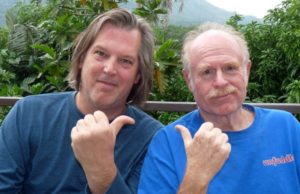Getting Past It
Getting past the bottlenecks
will be the essential challenge of a livable human future.
It is also the main challenge of all other earth species. The entire course of planetary evolution will be determined by the bottleneck events set in this century.
There is no question bottlenecks will occur, even though you’ve never seen it in the news. It’s based in thermodynamic laws and the nature of the universe. Only the details are hidden from us.
We can, however, steer through these bottlenecks, at least in principle. And we can steer other species through it. In principle.
The future exists as a set of probabilities. Right now, many of those future probabilities look terrible. With business as usual, we will acidify (and largely kill off) the seas this century, dissolving coral reefs, shells, plankton and calcareous skeletons. We’ll heat the planet to the point the equitorial latitudes won’t be livable for the species which live there now, including humans. The rainforests will burn. Antibiotics will become useless.
It may not seem plausible from a short-term perspective, but the intricate systems we now rely on to keep ourselves alive will cease to work at some point in the decades to come. And we’ll find out what happens when 10 billion people don’t have enough to eat or drink, and too little energy to change that fact.
If we’re not honest about what’s coming, we can’t steer through it. We’ll lose it all.
But that isn’t inevitable, it’s just probable. It’s still possible for there to be a living, healthy world – if somewhat degraded – and happy human children living decent lives in 1000 years and even 100,000 years. That possibility is currently slipping from our fingers, but it is not yet lost.
That’s what The Bottleneck Foundation is about. A human future, an earth future, that’s worth fighting for. A new set of strategies, and a new way of looking at things, to guide us to some decent version of that future… on the other side of the Bottleneck.
A New Way to Be
We won’t get through
the bottlenecks doing as we have done. Nor will earth’s ecosystems.
The converging crises are every bit as predictable as the population rise and fall of yeast in a wine bottle. Humans are wonderful and unique, but we are thermodynamic creatures, subject to the laws of nature.
If we are to steer to a decent future for our species and its cohorts, we need to take an honest look at these laws of nature and the fundamental limits imposed by net energy and planetary carrying capacity.
And that means re-framing nearly every issue in those terms.
Our cultures today view the world and its issues with an assumption of continuity, and that things will generally get easier as time goes on. This is incorrect. Things will be getting more difficult, and the systems we rely on will become less reliable.
This means that everything from wildlife conservation to fisheries to farming; everything from health care to jobs to transportation, will face a set of challenges that pretty much nobody is now planning for.
This is the challenge of the bottlenecks. We have human populations which are largely oblivious to anything but the short term, we have natural ecosystems crumbling, and we’re going to start having less net energy to deal with it every year from now on. We need to take that messed-up situation and steer it to an emergency landing somehow.
Because everything depends on it.
The Bottleneck Foundation is systems scientists, specialists, and conservation campaigners trying novel strategies to try getting a livable world past the bottleneck.
Join us.
Hitchhiking in the direction of Sapience: Nate Hagens & DJ White
The co-authors of the new “Bottleneck” paradigm are well-known energy and systems expert Dr. Nate Hagens and environmental strategist (and EarthTrust founder) DJ White. Together, they’re doing a “grand synthesis” of current science to highlight the basic disconnect between the way humans have evolved to think about the world, and the way the physical world actually exists. Despite being based on well-established science, this synthesis leads to conclusions about the future that are quite different from those now expected by society.
The Bottleneck Foundation will spin off multiple initiatives based on this “better way to think about physical reality”, focused on ecology, energy, and the human future; and productive ways individuals and small groups can engage in steering the systems around us in better directions. This site will get a lot larger and more exciting as this year goes on…
Bottleneck Foundation Buildout Collaboration!
EarthTrust and Overstory Alliance are collaborating to build and flesh out the Bottleneck Foundation as centerpiece of a new way of identifying and addressing humanity’s – and the earth ecology’s – biggest emerging crises. This melds the Science Synthesis, a specific Ethic for Life, and a new toolkit of methods called Effectivism.
Overstory Alliance is an organization organized by Nate’s former students, who took Reality101 and changed the course of their lives to dig deeper and make a difference.
Stay tuned; it will go live early in 2023!



















